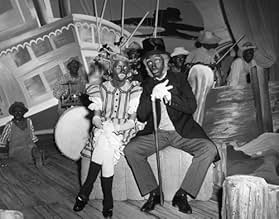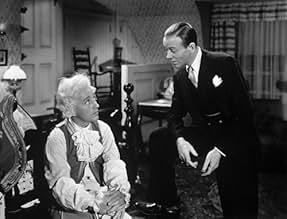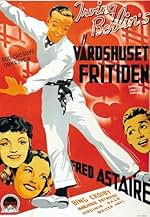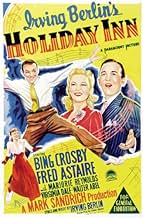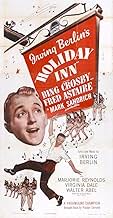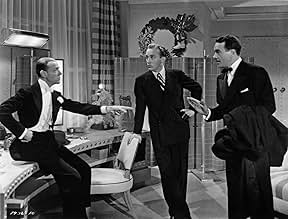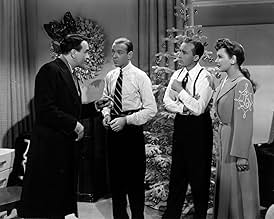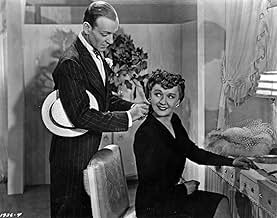AVALIAÇÃO DA IMDb
7,3/10
19 mil
SUA AVALIAÇÃO
Em uma pousada que só abre nas férias, um cantor e outro homem competem pelo afeto de uma bela intérprete em ascensão.Em uma pousada que só abre nas férias, um cantor e outro homem competem pelo afeto de uma bela intérprete em ascensão.Em uma pousada que só abre nas férias, um cantor e outro homem competem pelo afeto de uma bela intérprete em ascensão.
- Direção
- Roteiristas
- Artistas
- Ganhou 1 Oscar
- 3 vitórias e 2 indicações no total
Bob Crosby Orchestra
- Orchestra
- (as Bob Crosby's Band)
Edward Arnold Jr.
- Second Dancer Ted Bumps Into
- (não creditado)
Loretta Barnett
- Dancer
- (não creditado)
Muriel Barr
- Dancer
- (não creditado)
Harry Barris
- Midnight Club Orchestra Leader
- (não creditado)
Patsy Bedell
- Dancer
- (não creditado)
Avaliações em destaque
This movie has so much and if you can make the chemistry thing the sparking between Bing and Fred and ignore the sidebar romances that don't quite grab you, then you will truly enjoy it. "White Christmas" - the first performance of the standard and it always grabs me. And I must have seen it fifty plus times. The dancing scene with Fred and the firecrackers, stupendous, incredible, how DID he do it?? Forget the blackface bits, slightly offensive, even considering the era. And the rah-rah-rah for WW2. Evocative of 1942 and FDR. Everything comes together beautifully down to the encore of "White Christmas" and Bing in the best of voice all through. Story is just about zero and no credibility - imagine an inn open fifteen days of the year with an enormous cast for the floor show (with full orchestra, no less). Bankrupt after the payroll for one holiday would be my guess :>). But lovely and nostalgic and worth watching over and over, just for the boys, Fred and Bing. 7 out of 10.
This film is good in so many ways. The song and dance numbers were all great. Teaming Bing Crosby and Fred Astaire was a great idea. These two played off each other so well that I can't imagine two other actors doing so well. Even Crosby and Hope wouldn't have done as well here. Marjorie Reynolds was a treat to look at but also had good chemistry with both Crosby and Astaire. The support cast was equally as good, Walter Abel as Danny Reed, Virginia Dale as Lila Dixon and Louise Beavers as Mamie gave solid performances.
The set was also beautiful. Obviously the Hollywood set of Holiday Inn at the end of the film that was supposed to be a reproduction of the real Holiday Inn in Connecticut is the same set used for both scenes. However it is such a realistic set that the viewer never suspects that the Connecticut scenes were filmed indoors. I think the fact that the film was in black and white helps in that respect. A color film may have actually looked more phoney.
The story is a simple one but well put together. I think many viewers can relate to guys trying to steal girls from one another, its a common enough practice today. The ending is a bit fairy tale like but then that is why so many probably like it. We get enough "reality" in our every day lives. It is nice to escape reality with a film like this.
Lastly, the black face scene during the Lincoln Day performance is offensive but it does not ruin the film. Of course a minstrel show today using black face would be unacceptable in today's environment but you can't hold a 1940's film to the same standards. I know some would like to have that scene removed from the film but I disagree. I am of African American decent and while I could view this film as a disgrace I accept it for what it is. Rather than try and obliterate scenes such as this from our film history I think they should be viewed as stepping stones to where African Americans are in film today. There may still be barriers that need to be broken through in the film world but considering where African Americans started we as a society should also take time to appreciate the accomplishments that have been achieved. Black face is out. Demeaning "yesum" roles are for the most part gone and now leading roles that portray African Americans in well to do positions in society are becoming more and more frequent. So while some of the film history regarding African Americans portrays them in a negative manner it is because of those actors and actresses were able to work in those roles and under those conditions that the modern day African American actors and actresses are able be seen in a more positive light. Ignoring the past roles ignores the actors and actresses that struggled through those times.
The set was also beautiful. Obviously the Hollywood set of Holiday Inn at the end of the film that was supposed to be a reproduction of the real Holiday Inn in Connecticut is the same set used for both scenes. However it is such a realistic set that the viewer never suspects that the Connecticut scenes were filmed indoors. I think the fact that the film was in black and white helps in that respect. A color film may have actually looked more phoney.
The story is a simple one but well put together. I think many viewers can relate to guys trying to steal girls from one another, its a common enough practice today. The ending is a bit fairy tale like but then that is why so many probably like it. We get enough "reality" in our every day lives. It is nice to escape reality with a film like this.
Lastly, the black face scene during the Lincoln Day performance is offensive but it does not ruin the film. Of course a minstrel show today using black face would be unacceptable in today's environment but you can't hold a 1940's film to the same standards. I know some would like to have that scene removed from the film but I disagree. I am of African American decent and while I could view this film as a disgrace I accept it for what it is. Rather than try and obliterate scenes such as this from our film history I think they should be viewed as stepping stones to where African Americans are in film today. There may still be barriers that need to be broken through in the film world but considering where African Americans started we as a society should also take time to appreciate the accomplishments that have been achieved. Black face is out. Demeaning "yesum" roles are for the most part gone and now leading roles that portray African Americans in well to do positions in society are becoming more and more frequent. So while some of the film history regarding African Americans portrays them in a negative manner it is because of those actors and actresses were able to work in those roles and under those conditions that the modern day African American actors and actresses are able be seen in a more positive light. Ignoring the past roles ignores the actors and actresses that struggled through those times.
Everyone has a favourite Christmas movie. For some it's "A Christmas Carol", or "Miracle On 34th Street", perhaps "It's A Wonderful Life", or maybe "How The Grinch Stole Christmas". Even Bing's later "White Christmas" gets aired locally every Christmas Day, while "Holiday Inn" is far more obscure. Yet, this film is my favourite holiday season film. Made long before I was born, I saw it as a child & it had an influence on me. Perhaps the film is dated with its B&W war-time feel but that 1940's elegance is part of the charm. Returning to the "Inn" is like re-visiting old friends at a magical, mythical place. It's a treat to see a younger Bing Crosby (compared with his performance in "White Christmas")& Fred Astaire, as well as the beauty of Marjorie Reynolds. What may not be well known is that the film provided the inspiration for the name of the Holiday Inn chain of motels & hotels. A Memphis businessman named Kemmons Wilson planned a national chain of motels. He hired a draftsman to draw up the plans. It happened that the draftsman watched the movie while he was working, and he sketched the name of it at the top. Wilson saw it, liked it, and stuck with it. Holiday Inn was born & the first opened in August of 1952, some 10 years after the film.
Sure, not all the holidays are treated in the film. And the Independence Day segment contains some war-time "propaganda" with newsreel shots of McArthur, FDR, & military hardware. But this was the era when Hollywood went to war & stars did pitches to audiences to buy war bonds, etc. Yes, the black-face Al Jolson style "Abraham" number causes me to cringe a bit, but the tune is snappy, and the justification is in keeping with the plot as Bing tries to hide Marjorie Reynolds from Astaire. The supporting characters are also fine. There's "Gus" the cab driver for the Inn, whom Bing gives 10 bucks to take a detour to keep Reynold's away from the Inn the night the Hollywood men are there. Bing says for that kind of money Gus should take her by way of "Medicine Hat" (a prairie town in Canada). I also enjoy character actress Louise Beavers portrayal of "Mamie", the Inn's cook. She's not only a mother figure to her two charming kids, but also to her boss. During Thanksgiving, Bing mopes while Astaire & Reynolds are filming in Hollywood together. He puts on a recording of himself singing "I've Got Plenty To Be Thankful For", while he comically criticizes himself - even saying "you're flat". Mamie tells him that all he did was tricks to keep Miss Linda. He was never honest with her & instructs him to go to Hollywood & tell her how he feels. The song "White Christmas" became a huge hit with this movie. It's sung twice. The first time, Bing is teaching it to Reynolds on the piano & they sing a duet with his coaching. The second time, at the end, it's an unplanned duet. Reynolds is singing it on a sound stage "mock-up" of the Inn, once again at a piano. She finds that at the same spot in the song as Bing had done earlier, she picks up his pipe & rings bells on a tree. Then Bing begins to whistle in the wings. Her solo is interrupted as Bing then sings a line or two. The song isn't completed this time! In the later film, Bing sings the immortal song "just like the record". "Easter Parade" was another Irving Berlin hit from this movie. It would inspire another Astaire movie later with that title.
This is not a perfect film but it has been an inspiration to me (& to others). The Inn is timeless. I can always re-visit every year or so & the comedy, songs & dance are eternal. Styles change. If "Jim Hardy's" Holiday Inn had been a real place, it probably wouldn't survive. The resorts of the Catskills, such as those in "Dirty Dancing" fell to changing times. Jim probably would have had to have rock acts in the 1950's (or Rap in the 1990's)! But I can always go home to this Inn & know what kind of enertainment is on tap. And also enjoy Mamie's cooking!
Sure, not all the holidays are treated in the film. And the Independence Day segment contains some war-time "propaganda" with newsreel shots of McArthur, FDR, & military hardware. But this was the era when Hollywood went to war & stars did pitches to audiences to buy war bonds, etc. Yes, the black-face Al Jolson style "Abraham" number causes me to cringe a bit, but the tune is snappy, and the justification is in keeping with the plot as Bing tries to hide Marjorie Reynolds from Astaire. The supporting characters are also fine. There's "Gus" the cab driver for the Inn, whom Bing gives 10 bucks to take a detour to keep Reynold's away from the Inn the night the Hollywood men are there. Bing says for that kind of money Gus should take her by way of "Medicine Hat" (a prairie town in Canada). I also enjoy character actress Louise Beavers portrayal of "Mamie", the Inn's cook. She's not only a mother figure to her two charming kids, but also to her boss. During Thanksgiving, Bing mopes while Astaire & Reynolds are filming in Hollywood together. He puts on a recording of himself singing "I've Got Plenty To Be Thankful For", while he comically criticizes himself - even saying "you're flat". Mamie tells him that all he did was tricks to keep Miss Linda. He was never honest with her & instructs him to go to Hollywood & tell her how he feels. The song "White Christmas" became a huge hit with this movie. It's sung twice. The first time, Bing is teaching it to Reynolds on the piano & they sing a duet with his coaching. The second time, at the end, it's an unplanned duet. Reynolds is singing it on a sound stage "mock-up" of the Inn, once again at a piano. She finds that at the same spot in the song as Bing had done earlier, she picks up his pipe & rings bells on a tree. Then Bing begins to whistle in the wings. Her solo is interrupted as Bing then sings a line or two. The song isn't completed this time! In the later film, Bing sings the immortal song "just like the record". "Easter Parade" was another Irving Berlin hit from this movie. It would inspire another Astaire movie later with that title.
This is not a perfect film but it has been an inspiration to me (& to others). The Inn is timeless. I can always re-visit every year or so & the comedy, songs & dance are eternal. Styles change. If "Jim Hardy's" Holiday Inn had been a real place, it probably wouldn't survive. The resorts of the Catskills, such as those in "Dirty Dancing" fell to changing times. Jim probably would have had to have rock acts in the 1950's (or Rap in the 1990's)! But I can always go home to this Inn & know what kind of enertainment is on tap. And also enjoy Mamie's cooking!
It is amazing how much the world has changed in the last 58 years. 58 years? Yes!
Reviewers who fault this movie for it's patriotism and display of martial force in the midst of a "holiday" movie are obviously too young to know what the world was like when this was made. It was a time of greater innocence, greater danger and greater racial discrimination. The innocence was that of the children and the general public who could take a "standard Hollywood plot" at face value. It was a time of danger, not necessarily from within society itself (as now when crime makes streets unsafe) but from the outside with dictators killing millions while they battle for world domination. Those tanks and planes WERE freedom. Without them we would be yelling "Seig Heil" today and would not have the right to critique a simple movie. The State would have made it for you and "you Will like it"!
As the "black face" routine was showing I turned to my family and said that I was sure that despite the "classic" status of this film there were probably a lot of people wincing as they watched Bing Crosby with burnt cork all over him.
I'm sure that before he died Bing too winced a little bit at that number, but taken in the context of history it was to be expected. Al Jolson made a career of blackface and never regretted it for a minute. Most of the American population accepted that that's "the way it is". Only in the last 40 years have we learned that's NOT the way it is.
Things change and it's understandable that after almost 60 years certain depictions of society as it existed then would be out of place today. 20 years ago the movie was popular but the music was certainly out of style. With the resurgence of the "big band sound" in the last 5-10 years people are noticing that Bob Crosby and the Bobcats were participants. No doubt a certain amount of nepotism existed, but Bob Crosby was not Billy Carter to Bing's Jimmy Carter. (Anyone under 20 can now run and look up Jimmy and Billy Carter.) Bob Crosby achieved a certain amount of star status with some of his recordings. He had 4 chart topping hits and led bands for almost 50 years. He was always eclipsed by his older brother, but then Bing Crosby was THE biggest star of that time, at least among singers.
Bob's music was a Dixieland style and it lent a lightness to the big band orchestrations of Irving Berlin's songs that might have otherwise made the music ponderous, too much so for this light comedy at least.
Remember, finally that when Holiday Inn came out we were losing WW2. The Pacific was a Japanese ocean, the Atlantic was virtually controlled by German U-Boats and Allied ships were being sunk within sight of American cities. The Axis also controlled all of Europe and the Russians were being rolled back into their own homeland.
Holiday Inn was escapist entertainment from this bleak reality and it is understandable if some martial patriotism was included to hearten the home front.
For 90% of the U.S., snow at Christmas is the exception rather than the rule, but the emotions expressed by the song White Christmas hit exactly the feelings of millions of soldiers taken from their homes to fight a war. If Holiday Inn did nothing else, it gave Americans something to believe in and remember when things were at their darkest.
"May your days be merry and bright, and may all your Christmases be White."
Reviewers who fault this movie for it's patriotism and display of martial force in the midst of a "holiday" movie are obviously too young to know what the world was like when this was made. It was a time of greater innocence, greater danger and greater racial discrimination. The innocence was that of the children and the general public who could take a "standard Hollywood plot" at face value. It was a time of danger, not necessarily from within society itself (as now when crime makes streets unsafe) but from the outside with dictators killing millions while they battle for world domination. Those tanks and planes WERE freedom. Without them we would be yelling "Seig Heil" today and would not have the right to critique a simple movie. The State would have made it for you and "you Will like it"!
As the "black face" routine was showing I turned to my family and said that I was sure that despite the "classic" status of this film there were probably a lot of people wincing as they watched Bing Crosby with burnt cork all over him.
I'm sure that before he died Bing too winced a little bit at that number, but taken in the context of history it was to be expected. Al Jolson made a career of blackface and never regretted it for a minute. Most of the American population accepted that that's "the way it is". Only in the last 40 years have we learned that's NOT the way it is.
Things change and it's understandable that after almost 60 years certain depictions of society as it existed then would be out of place today. 20 years ago the movie was popular but the music was certainly out of style. With the resurgence of the "big band sound" in the last 5-10 years people are noticing that Bob Crosby and the Bobcats were participants. No doubt a certain amount of nepotism existed, but Bob Crosby was not Billy Carter to Bing's Jimmy Carter. (Anyone under 20 can now run and look up Jimmy and Billy Carter.) Bob Crosby achieved a certain amount of star status with some of his recordings. He had 4 chart topping hits and led bands for almost 50 years. He was always eclipsed by his older brother, but then Bing Crosby was THE biggest star of that time, at least among singers.
Bob's music was a Dixieland style and it lent a lightness to the big band orchestrations of Irving Berlin's songs that might have otherwise made the music ponderous, too much so for this light comedy at least.
Remember, finally that when Holiday Inn came out we were losing WW2. The Pacific was a Japanese ocean, the Atlantic was virtually controlled by German U-Boats and Allied ships were being sunk within sight of American cities. The Axis also controlled all of Europe and the Russians were being rolled back into their own homeland.
Holiday Inn was escapist entertainment from this bleak reality and it is understandable if some martial patriotism was included to hearten the home front.
For 90% of the U.S., snow at Christmas is the exception rather than the rule, but the emotions expressed by the song White Christmas hit exactly the feelings of millions of soldiers taken from their homes to fight a war. If Holiday Inn did nothing else, it gave Americans something to believe in and remember when things were at their darkest.
"May your days be merry and bright, and may all your Christmases be White."
I am most certainly under 70 and I absolutely adore this movie! Fred and Bing are great together. The songs are some of Irving Berlin's best. With Bing's voice together with Fred's dancing...it is a first class classic! My sister & I always looked forward to watching this at the holiday season.
Você sabia?
- CuriosidadesThe Connecticut inn set for this film was reused by Paramount 12 years later as a Vermont inn for the musical Natal Branco (1954), also starring Bing Crosby, and again with songs composed by Irving Berlin.
- Erros de gravaçãoThe telegram that Ted Hanover receives from Jim Hardy on Christmas Eve is dated December 25th.
- Citações
Linda Mason: My father was a lot like you, just a man with a family. Never amounted to much, didn't care. But as long as he was alive, we always had plenty to eat and clothes to keep us warm.
Jim Hardy: Were you happy?
Linda Mason: Yes.
Jim Hardy: Then your father was a very successful man.
- Cenas durante ou pós-créditosIn the opening titles the main credits for Irving Berlin as composer and lyricist, and Mark Sandrich as producer and director, are each facsimiles of their genuine signatures.
- Versões alternativasIn 2008, the film was restored and colorized by Legend Films.
- Trilhas sonorasOverture
(uncredited)
Music and Lyrics by Irving Berlin
Performed by the Paramount Pictures Studio Orchestra and Chorus conducted by Robert Emmett Dolan
Principais escolhas
Faça login para avaliar e ver a lista de recomendações personalizadas
Detalhes
Bilheteria
- Orçamento
- US$ 3.200.000 (estimativa)
- Faturamento bruto mundial
- US$ 80
- Tempo de duração1 hora 40 minutos
- Cor
- Proporção
- 1.37 : 1
Contribua para esta página
Sugerir uma alteração ou adicionar conteúdo ausente

Principal brecha
By what name was Duas Semanas de Prazer (1942) officially released in India in English?
Responda

